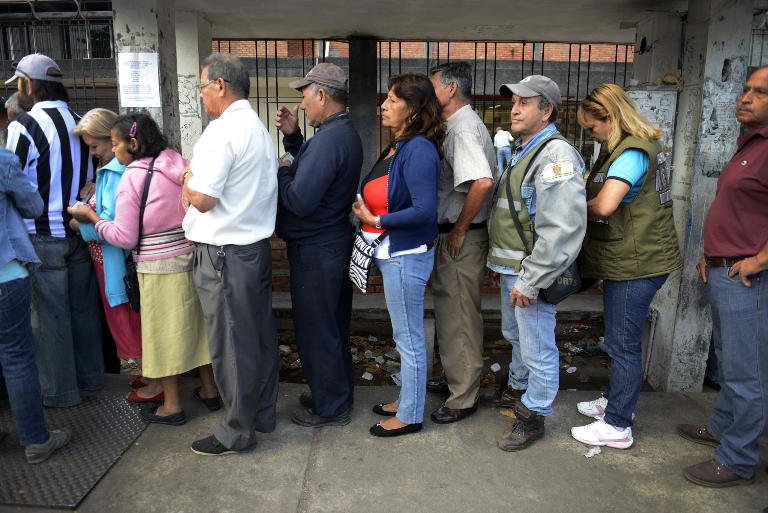(MENAFN- AFP) Patricia Gamboa arrived at a government-run supermarket in western Venezuela at 2:00 am, six hours before doors opened, to be first in line and buy whatever she could get her hands on.As dawn broke, about 200 people stood behind her outside the Bicentenario shop in San Cristobal, with numbers written on their wrists with green markers to avoid arguments over who came first.One end of the street was blocked by one of the many barricades that demonstrators have built with trees across the city to protest, among other things, the basic food shortage plaguing their oil-rich country.The empty store shelves are among the major grievances fueling a wave of protests that have spread to other cities and dogged President Nicolas Maduro for the past month.Like in other parts of the country, flour, butter, cornmeal and cooking oil are hard to come buy in this city where Venezuela's protest movement emerged on February 4.
Gamboa, the 58-year-old customer with the number one scribbled on her wrist, did not have a shopping list to feed her family of six.What was she hoping to buy, then?"Whatever they have," she said, echoing the sentiment of everybody else reading, sipping coffee or sitting on the sidewalk to pass the time.Residents can only shop at Bicentenario on certain days, which are decided by the last numbers on their ID cards. Once in line, people agreed on the wrist number system to avoid trouble, but the shop also assigns them paper numbers.Across the city, even longer lines stretched 200 meters (yards) deep at two private supermarkets.- No bread by Tuesday -Armando Mirando, vice president of the Tachira State Bakeries Association, told AFP that San Cristobal could run out of bread by Tuesday.He said trucks that normally deliver flour and butter have refused to come into the city for the past two weeks because of the chaos caused by the barricades."We already had shortages before and now nothing is arriving," Mirando said after addressing a "peace conference" organized by the government to end the protests but shunned by the opposition as a sham.Most shops and restaurants are closed in the city of 260,000 people.The opposition blames the country's economic troubles on the government's price and foreign exchange controls, and super-inflation of 56 percent.Critics say businesses are not given enough dollars by the government through its currency agency to import enough goods.Maduro blames smugglers who take advantage of Venezuela's weak currency to sell food and gasoline across the border in Colombia at a hefty profit.Either way, for Venezuelans, the result is high prices and empty store shelves.Those lucky enough to find what they need at government-run stores will pay at regulated prices. At private markets, items can be three, four, even seven times more expensive.Life can be tough for those earning a minimum wage standing at 3,270 bolivars per month -- $519 at the official rate of 6.3 bolivars to the dollar.San Cristobal residents say the normal price for one kilogram of powdered milk is 30 bolivars, but it can cost up to 250 bolivars in markets.This means that at the official dollar exchange rate of 6.3 bolivars to the dollar, the price jumps from $4.8 to $39.7.But there is a black market rate in Venezuela, which has quadrupled over the past years from 20 to around 80 bolivars to the dollar.Other examples include flour: officially 6.5 bolivars, market rate 30 bolivars. As for meat, one kilogram should cost 60 bolivars, but shops demand up to 250 bolivars.- More profitable than cocaine -The contraband business is well known in San Cristobal, the capital of Tachira state, which borders Colombia.Maduro appeared on state-run television Friday, showing a milk carton that costs seven bolivars. He said it sells at 200 bolivars in Colombia."It's a crime," the socialist leader said, vowing to take economic and police action. "You make more by selling milk than selling cocaine today at the border."Maduro said smugglers can gain 10 times more by selling fuel across the border. Gasoline in oil-rich Venezuela is cheap, costing less than $1 to fill a tank.But many residents of San Cristobal, an opposition stronghold, say corrupt government workers are among those smuggling goods across the border.All they want outside the Bicentenario is full shelves."The government has us begging here," said Carolina Rodriguez, 35, customer number 187 at the end of the line."We spend our lives in line," she said, "for the supermarket, to pay our cellphone bills, to pay for the light or water." Legal Disclaimer:
MENAFN provides the
information “as is” without warranty of any kind. We do not accept
any responsibility or liability for the accuracy, content, images,
videos, licenses, completeness, legality, or reliability of the information
contained in this article. If you have any complaints or copyright
issues related to this article, kindly contact the provider above.




















Comments
No comment